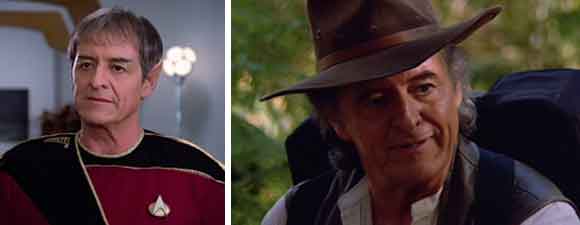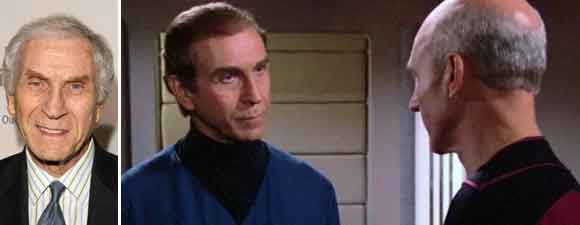Retro Review: Homeward
8 min readWorf’s human foster brother uses the Enterprise to violate the noninterference directive in order to save a primitive race.
Plot Summary: Worf’s foster brother Nikolai Rozhenko sends out a distress call from Boraal II, a planet with a pre-warp civilization whose atmosphere is unexpectedly dissipating. The Enterprise is the nearest starship and Rozhenko hopes to evacuate the Boraalans from the village he has been observing, but Picard refuses, citing the Prime Directive. The crew watches as all life on Boraal II ceases to exist, though a power drain disrupts the viewscreens. When Worf investigates the power drain, he traces its source to the holodeck, where Rozhenko has hidden the Boraalans in a replica of the cave where they had taken shelter as their atmosphere was disintegrating. Picard is furious, yet sees no alternative but to try Rozhenko’s plan to relocate the Boraalans to an uninhabited planet, using the holodeck to simulate a journey to their new home without revealing to the Boraalans that they have traveled through space. Because the holodeck is still experiencing power fluctuations, Worf is sent to supervise and to send covert messages to the engineering teams. Rozhenko introduces Worf as his brother, a Seer who will guide them to a safe haven, while Data and Crusher search for a new planet, finally choosing one with a somewhat more hostile climate than Boraal had. The Boraalan chronicler Vorin is distressed because he has lost part of the written history of the village and when he goes to find it, he spots the half-hidden holodeck arch, which takes him into an Enterprise corridor. Because of Boraalan physiology, Crusher cannot erase Vorin’s memory, so Picard asks him to choose whether to return to his people or remain among the Starfleet crew. Meanwhile, Worf learns that a Boraalan woman is pregnant with Rozhenko’s child and has a furious argument with his brother about Rozhenko’s lifelong rash behavior. By the time the Enterprise reaches the planet to resettle the Boraalans, Vorin has committed suicide, having concluded that he would destroy his people’s beliefs if he returned to them but that he will never fit in anywhere else. The holodeck power systems begin to collapse, but Worf is able to convince the Boraalans that it is a final storm system and to beam them to the surface before anyone realizes the environment is artificial. Rozhenko chooses to remain with the Boraalans as their new chronicler, and to raise his unborn child. Once the Boraalans are safely settled on their new world, Worf acknowledges that Rozhenko has saved an entire race and is finally taking responsibility for his own actions.
Analysis: I’ve only seen “Homeward” once before, and I had recalled that I hated it, so it surprised me on rewatching to find that it’s actually quite a good episode – if one ignores Captain Picard, who has seemingly become an Evil Admiral before his time. I know that every Evil Admiral must have been a captain once, and become overly intoxicated with his or her power, but given Picard’s usually balanced and admirable restraint in other situations in which he is asked to play God, his rigidity here is simply inexcusable. Sure, there’s an argument to be made that saving a race nature has marked for death may violate the letter of the Prime Directive, which stipulates that there must be no interference with the development of pre-warp civilizations, but this isn’t a case of giving aliens weapons or spaceflight or even rudimentary tools; this is a case where the natural development of the species is going to come to a halt forever if something isn’t done. Might there be long-term consequences for the galaxy, like the possibility that the Boraalans will survive to develop spaceflight and also develop some deadly retrovirus that kills other species? Again, sure, but that could happen with any species anywhere. It is mind-boggling to me that Picard quickly forgave Data for saving the fledgling exocomp “species” at the risk of the entire ship, and Picard allowed Data to save the planet of his underage pen pal, yet Picard refuses to grant permission to Rozhenko to save a peaceful, intelligent, resourceful race of humanoids, even though Rozhenko has a plan to honor the spirit of the Prime Directive by never letting the Boraalans know that they have left their original planet. If Picard had been willing to work with Rozhenko instead of making the latter sneak around – and Picard did let him sneak around, there’s no other way I can explain the epic negligence of the entire crew while Rozhenko was commandeering the transporters and beaming what could have been an alien army onto the holodeck – they might have anticipated the system failures that led to Vorin’s death.
I can’t think of another episode where Picard seems so cowardly to me, letting someone sneak behind his back to do what even he ends up acknowledging is the right thing regardless of his interpretation of the letter of the law. The fact that he thinks the decision should be his alone, with no attempt to contact Starfleet or even engage his senior officers until after the fact, erases for me any concern that saving the Boraalans constitutes playing God. Rather, Picard’s making the sole decision to allow a species to die looks far more egotistical and terrifying to me. By Picard’s logic, not only should humans not be trying to save animal species nearing extinction on Earth during our own century because we’d be interfering, but we have no business evacuating islanders during volcanic eruptions or airlifting children out of wildfires if their own villages don’t have steamships or helicopters in the first place. Yes, there’s a fine line between charity and interference, but when the alternative to interference is the extermination of an entire people, arguments that intervention would change those people’s development seem extremely petty. I’m picturing Kirk in the same situation; he’d probably have to be reminded by Spock that it might be construed as a violation of the Prime Directive to get involved, at which point Kirk would acknowledge that there could be a court-martial, then head to the transporter room and beam the aliens up himself, with the full encouragement of McCoy and the technical assistance of Scotty. I have no doubt that Spock would be right next to him – Spock, after all, didn’t try to stop Kirk’s plan to strand Khan’s people on Ceti Alpha V, nor Kirk’s meddling with Vaal, Landru, etc. Sometimes interference seems like the logical thing, and as far as I can tell, Starfleet gives its captains a great deal of leeway in deciding when that might be true.
I often think the Prime Directive is entirely for the good of the advanced civilizations, so they don’t get any ideas about playing God, rather than for the good of the civilizations whose development might be affected. There’s powerful condescension in the assumption that everyone would want what the Federation has. I love how the Na’vi reject everything the humans think they have to offer in James Cameron’s Avatar, and I suspect something similar might occur if the Boraalans were offered the opportunity to live on starships among replicators and transporters. Vorin takes his life because he feels completely alone, yet it’s not that life among the stars is so unthinkable to him, nor that he can’t handle the idea that there are thousands of other worlds with people like his own. Many civilizations, our own included, imagine life elsewhere long before developing technology which could prove its existence. As Crusher points out, if humans had never interfered, Vorin would be dead anyway, asphyxiated when his planet’s atmosphere vanished, so while his death is sad, one can hardly label it a crime. It’s funny to me that Nikolai Rozhenko isn’t disciplined for a violation of his position that would certainly get him fired and might get him prosecuted in our own era: he becomes intimately involved and conceives a child with a woman whom he’s supposed to be studying as a researcher. Only Worf yells at him about that, and then it’s more in the context of “How could you have mated with someone so inferior” than in terms of what Federation laws must be in place to prevent the exploitation of people in pre-warp civilizations. No one seems all that concerned with this ethical violation, particularly since Rozhenko intends to “take responsibility,” stay with the woman and raise his own child. He’s going to have to lie for the rest of his life to her and to that child about who and what he is, but compared to the sin of being willing to let her entire civilization die, this seems quite a small betrayal. Indeed, the fact that it’s possible proves that the Boraalans are scarcely different from humans biologically, so maybe developmentally it won’t take too long to catch up.
There are other problems with “Homeward,” starting with the introduction of a foster brother for Worf – you’d think that at some point during the episodes with Kurn and the Klingons, or the senior Rozhenkos, there would have been some discussion of the fact that Worf had a human brother who was an Academy dropout and something of a disappointment to an honor-seeking Klingon being raised by humans. Nikolai doesn’t have to be Worf’s brother for their conflict to make sense. I also wonder why the medical staff doens’t sedate the Boraalans when the holodeck starts malfunctioning, waking them up with just enough time to emerge from the “caves” into their new environment. And I’ve said this before, but why do Troi, Crusher, et al leave lost and miserable young people alone for hours on end, then act surprised when those young people do self-destructive things? Of course Vorin felt completely lost and alone, with a guard outside his quarters but no counselor or educator in with him! Yet for all these criticisms, the episode is well-directed, the pacing is enjoyable, Paul Sorvino and Michael Dorn both give strong performances (and what a treat to see Penny Johnson a.k.a. Kasidy Yates, even if her character is negligible), and Nikolai Rozhenko is a breath of fresh air so far as Federation dogma is concerned. It’s just a shame that he has to make the speech defending the Baraalans’ right to live instead of Picard, particularly when Crusher and Data seem to dissent from the start and everyone ultimately agrees that Rozhenko made the right call. This is one episode that could have used an evil admiral to take the hard-line position and left the captain to show why we need compassionate leaders to interpret even the most well-intentioned laws.






